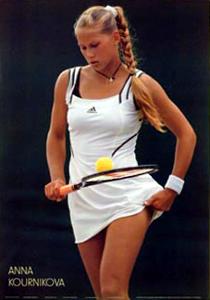|
The New Female
Athlete
by Margarita Berstos
Produced
for the Web by Kathy Ritchie
 Anna Kournikova Serving
It Up
Anna Kournikova Serving
It Up |
"Power
Hour" for most college girls is the 60-minute period between
11 p.m. and midnight when, at a place like Bar None in New
York's East Village, well drafts and mixed drinks cost a
dollar apiece. For women athletes, however, "Power Hour"
has an altogether different connotation.
Andrea
Cafiero, a varsity volleyball player for Quinnipiac University's
Division I Braves, submits to eight required "Power Hours"
every week. For periods of about two hours at a time, she
signs herself into a room with her books, and on most days,
does her schoolwork. "Trust me," she says of the temptation
to skip out, "there are repercussions. We're at practice
and our coach will say, 'Andrea didn't do her eight hours
this week, she only did six,' so the team is going to have
to run two suicides in lieu of the hours I missed."
There
is no chance for the other kind of "Power Hour" either.
Athletes at Quinnipiac College must adhere to a 48-hour
ban on drinking before a game or practice. "So basically,
we can't drink at all during season," says Cafiero. The
same is true at Yale, where Christine Anthony, a field hockey
player, says the disciplined life of the athlete has put
special strains on her friendships as well as her social
life. "I remember my freshman year roommate when I was in
season in the fall, said she didn't even know who I was
until the spring," says Anthony. At Yale, she finds athletes
make friends among the athletes. "They understand where
you're coming from," she said. "They understand when you
need to go to bed."
| "Now
there are role models who are the antithesis of Kate
Moss, women with muscles, women with power." |
At a
point in life when, for most young women, the most important
new relationships are being forged, bonds to parents are
being loosened, identity is being solidified, and child-bearing
years are just ahead, female athletes are molding the concept
of gender into a shape all their own. Eve
as Athlete has to participate in relationships in a whole
new way, even her relationship to self.
For
Marie Golden, a junior at Holy Cross University, crew is
the all-consuming activity in her college life. "It's frustrating
sometimes not to be able to go out on your roommates birthday,
or your friend's birthday-or even your own birthday," she
says. Golden has practice six times a week, for three hours
at a time, not including a weight-lifting program twice
a week. Passion, she says, is what drives her to row and
row well. Knowing when she gets out there, there will be
eight other girls in the boat, feeling what she is feeling
is what gets her to go. It's the camaraderie. "In every
sense," says Golden, "we're all in the same boat." She said
some of her best friends are also her teammates because
of the concentrated time that they spend together.
In the
words of Mary Jo Kane, a sports psychologist and Director
of the Tucker Center for Research on Girls and Women in
Sport at the University of Minnesota, the impact sports
can have on a woman's life is boundless. "It can help with
her sense of identity in terms of belonging to a team or
group," says Kane, "which in turn can make her feel part
of a larger community like a school or a state or a university,
or even her country if she's an Olympic athlete."
College
sports can have impact - both positive and negative - on
family life, even when student athletes are far from home.
Andrea Lytle, a junior who plays water polo for Boston College,
says her participation in sports has actually improved her
familial relationships. "It lets parents and siblings become
involved in your life in a non-intrusive way," says Lytle.
"Having a parent ask about your game is a lot less intrusive
than having them ask about your boyfriend."
NEXT: Not so for Penny Vastakis...>>
|

